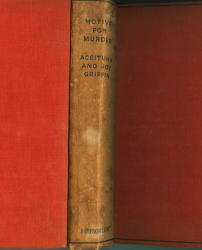Sat 26 May 2007
Review: ACEITUNA & JOY GRIFFIN – Motive for Murder.
Posted by Steve under Authors , Crime Fiction IV , Reviews[2] Comments
ACEITUNA & JOY GRIFFIN – Motive for Murder
Sampson Low, Marston & Co; UK, hardcover. No date stated (but 1935, according to CFIV).
Neither lady was an author I’d heard of before I happened to read this book, and if you were tell me that you have a complete set of their combined works, I’m not sure I’d believe you. Joy Griffin has only the one co-authorship to her credit in Crime Fiction IV, by Allen J. Hubin. Aceituna Griffin, on the other hand, has a few others, the first few of them of only marginal crime content, as indicated:
GRIFFIN, (Editha) ACEITUNA (1876-1949)
-The Tavistocks (n.) Laurie 1908
-Pearl and Plain (n.) Longman[s] 1927
-Amber and Jade (n.) Longman[s] 1928
-Genesta (n.) Murray 1930
-Conscience (n.) Murray 1931
Delia’s Dilemma (n.) Pawling 1934
Motive for Murder [with Joy Griffin] (n.) Low 1935 [England]
Commandments Six and Eight (n.) Low 1936
The Punt Murder (n.) Low 1936 [England
Sweets and Sinners (n.) Low 1937
“Where There Is a Will…” (n.) Low 1939
By the judicious use of Google, I’ve found a few other non-crime books by her, romance and/or historical fiction by the looks of the titles. I won’t list them here, but the link is there to follow if you wish.
I did discover that Aceituna’s maiden name was Thurlow, which is something that Al Hubin hasn’t happened to have mentioned. Her husband’s name was Robert Chaloner Griffin, which throws my initial supposition that Joy and Aceituna were sisters right out the proverbial window.
Except for the book at hand, that’s as far as I’ve been able to go in digging up information about either of the authors. In regards to the book itself, I have to confess that I was hoping for more when I picked it up to read. Which of course is a comment you should immediately ignore, since a general rule of thumb for reviewers is to review the book you have, and not the book you thought you had.

Which is the story of Clarissa Lovell, a naive young girl nearing the age of 21 who was brought up by foster parents in a quiet, isolated section of England. When the two elderly folks who raised her decide to try their hand in Africa and become missionaries, Clarissa’s only option is to go live in London with her guardian and his wife, who are nearly strangers to her, and a change of scenery so abrupt from her previously sheltered life that her head spins at the thought of it.
What’s many times worse is that the new people who are now in charge of her life have Plans for her. The most immediate of these is that she marry their son, Gilbert, who seems only moderately interested in the idea himself. You may have noticed a phrase that I mentioned in the paragraph above — nearing the age of 21 — and I imagine that may give you an idea of what the Plans are all about.
Entangled in a web of deceit like this, as she slowly but surely finds out, she succeeds in making her escape, and only in the nick of time — matters having gotten rather tense right about then — and she heads off for Sicily on her own, where…
I’m sorry to say that I can’t say more, but please rest assured that things do not fare for her well there either, with Mrs. Maxton, her guardian’s wife, picking up her trail more quickly than sin.
You may also rely on my saying so that the unscrupulous plotters are really, really up to no good. Before Clarissa realizes it, she is once again in a rather bad spot. You may be surprised to learn that this rather naive approach to story-telling nevertheless makes for moderately enjoyable reading — if, and it’s a big if, you have the patience to give the book its head and allow it to find its own way, which it does very well indeed, thank you very much.
There is no detection in this book, though, a fact which is still greatly to my own personal regret, no matter what rule of thumb happens to be in force, just a good old-fashioned dose of gothic suspense taking place in another time and another place rather far from our own. Young girls could still be terribly unsophisticated in 1935, and maybe they were in the mid-1960s and 1970s when the gothic romance craze hit both England and the US again for reasons not yet totally clear, but other than that, not in recent times that I can think of, no.
September 6th, 2015 at 6:54 am
Joy was, indeed, the daughter of Aceituna Griffin. My mother and her siblings knew her and her brother Jonathan in Wargrave near Reading, Berkshire (U.K.), when my grandparents brought their family there in about 1927. My grandfather became a business partner with Major R.C. Griffin in the firm of Allen and Simmonds of Reading.
March 21st, 2021 at 1:48 pm
I got the Book Commandments six and Eight from the Penzler auction. It’s a Romantic mystery for sure but that was very common for the day.